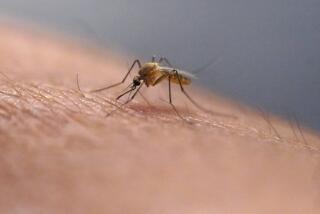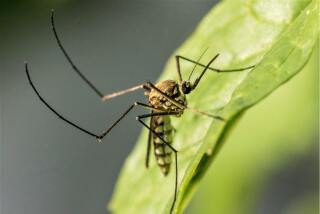County urges meningitis vaccinations for men who have sex with men
- Share via
Citing a recently identified uptick in potentially deadly meningococcal disease, the Los Angeles County Department of Public Health recommended Wednesday that men who have sex with men get a meningitis vaccination.
All men who have sex with men, whether or not they identify as gay or bisexual and “regardless of HIV status, who regularly have close or intimate contact with multiple partners, or who seek partners through the use of digital applications, particularly those who share cigarettes, marijuana or use illegal drugs, should visit their health provider to be vaccinated against invasive meningococcal disease,” department director Dr. Jonathan Fielding said in a statement.
The county will provide free vaccinations for patients without health insurance, starting on April 3, he added. Those interested can call 211 or visit the department’s website to get a listing of provider clinics.
The new recommendations follow confirmation of eight cases of invasive meningococcal disease in the county so far in 2014. Four occurred in men who have sex with men; three of those were in men who were HIV-positive.
The county’s response to earlier meningitis cases in the gay community came under fire from healthcare advocates last year. The department said that in contrast to investigations of illnesses in 2012 and 2013, “commonalities were found” among the four cases in men who have sex with men this year: Three lived or socialized in the West Hollywood and North Hollywood areas and three were 27-28 years of age. The fourth meningitis patient was 50 years old, the department reported.
Invasive meningococcal disease stems from a rare bacterial infection that can spread to the blood, brain or spinal cord and can affect the entire body -- sometimes causing death.
It is spread by close exposure to sneezing or coughing or direct contact with saliva or nose mucus -- though it’s less contagious than influenza, the health department said.
Activities associated with risk for the illness include smoking, close contact with an infected person such as kissing or sharing beverages or cigarettes and living in group settings for prolonged periods.
Symptoms of the illness usually strike within five days of exposure to the bacteria, and may include a high fever, stiff neck, aversion to bright light and aches.
The bacterial strain most common in Los Angeles is covered by the current meningitis vaccine. After outbreaks in recent months, students at Princeton University in New Jersey and UC Santa Barbara were offered access to another vaccine, not yet approved for use in the U.S., to prevent a different form of the disease.
Twitter: @LATerynbrown
More to Read
Sign up for Essential California
The most important California stories and recommendations in your inbox every morning.
You may occasionally receive promotional content from the Los Angeles Times.











